Module 3 Journey to space模块小结课件47张PPT
文档属性
| 名称 | Module 3 Journey to space模块小结课件47张PPT |  | |
| 格式 | pptx | ||
| 文件大小 | 2.6MB | ||
| 资源类型 | 试卷 | ||
| 版本资源 | 外研版 | ||
| 科目 | 英语 | ||
| 更新时间 | 2021-03-10 21:16:12 | ||
图片预览


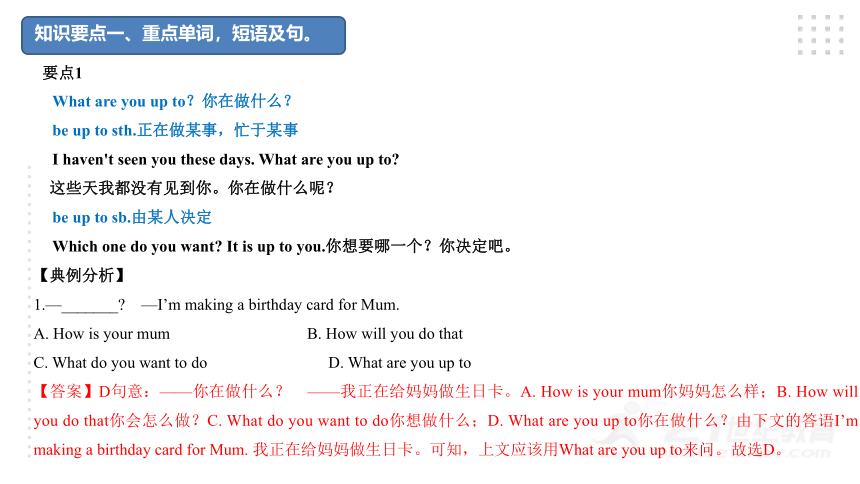
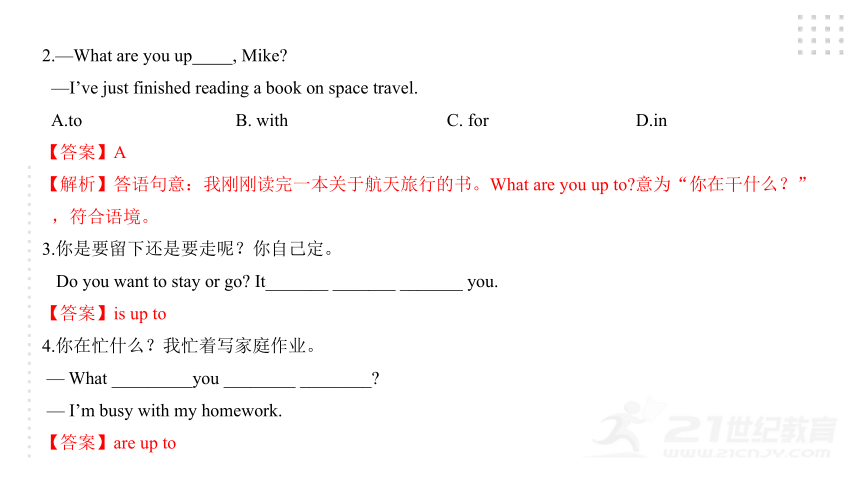
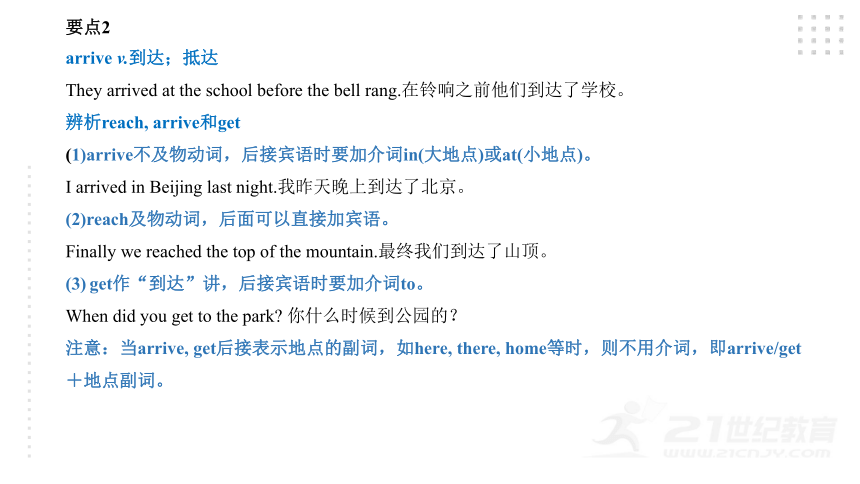
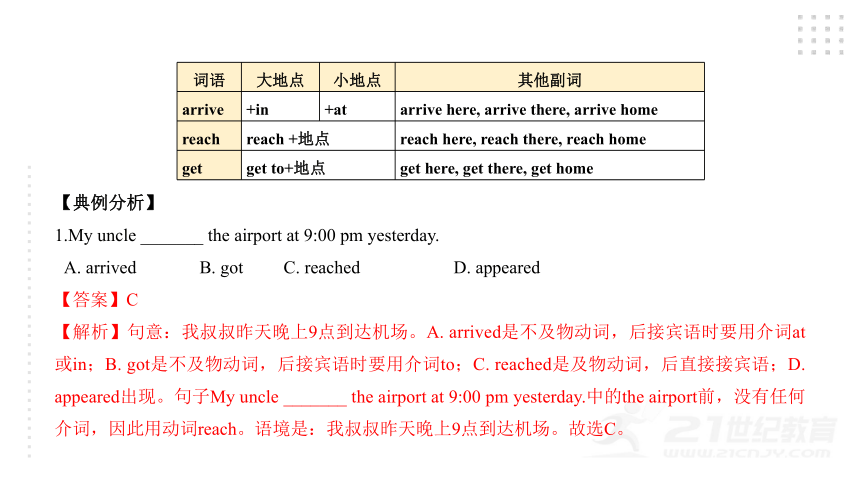
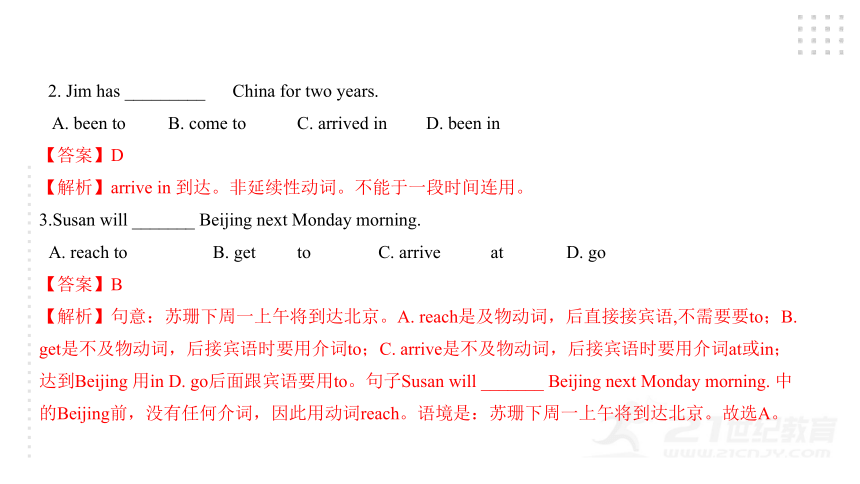


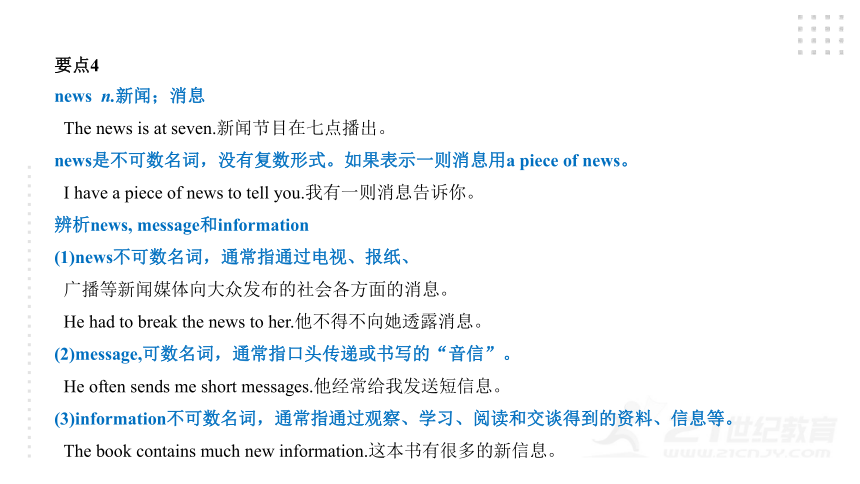
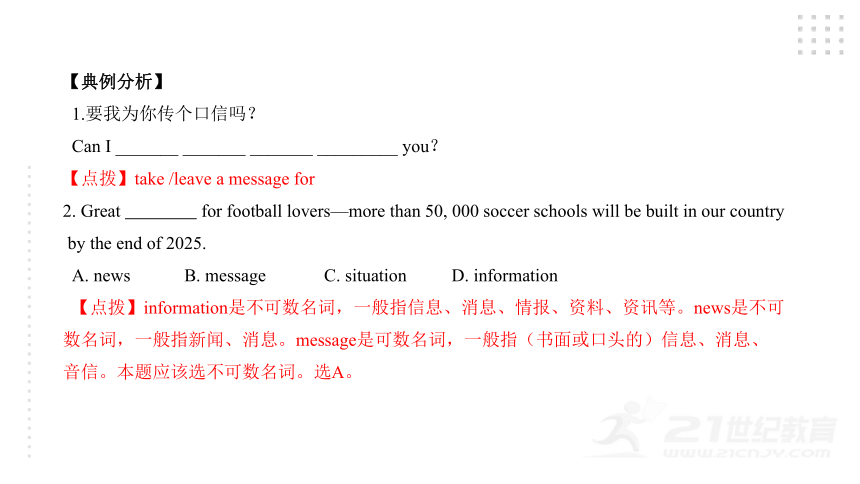
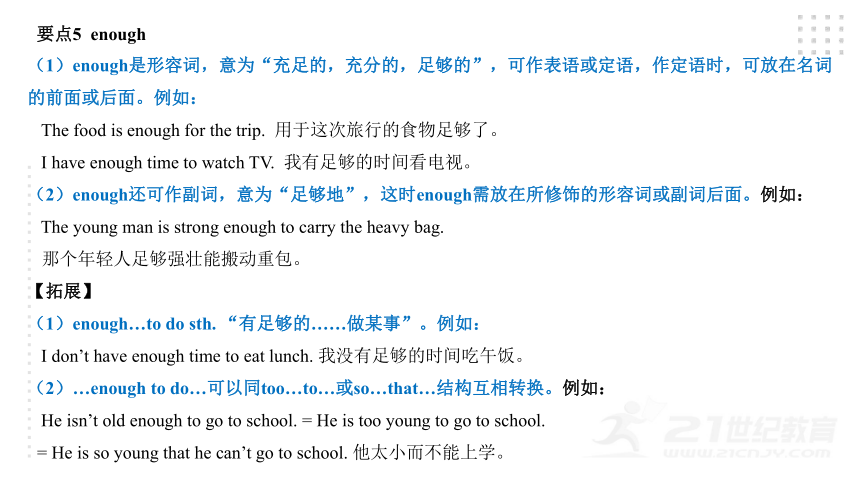
文档简介
英语(外研版)
八年级 下册
English
模块小结
Module 3
Journey to space
思维导图
知识要点一、重点单词,短语及句。
要点1
What are you up to?你在做什么?
be up to sth.正在做某事,忙于某事
I haven't seen you these days. What are you up to?
这些天我都没有见到你。你在做什么呢?
be up to sb.由某人决定
Which one do you want? It is up to you.你想要哪一个?你决定吧。
【典例分析】
1.—_______? —I’m making a birthday card for Mum.
A. How is your mum B. How will you do that
C. What do you want to do D. What are you up to
【答案】D句意:——你在做什么? ——我正在给妈妈做生日卡。A. How is your mum你妈妈怎么样;B. How will you do that你会怎么做?C. What do you want to do你想做什么;D. What are you up to你在做什么?由下文的答语I’m making a birthday card for Mum. 我正在给妈妈做生日卡。可知,上文应该用What are you up to来问。故选D。
2.—What are you up , Mike?
—I’ve just finished reading a book on space travel.
A.to B. with C. for D.in
【答案】A
【解析】答语句意:我刚刚读完一本关于航天旅行的书。What are you up to?意为“你在干什么?”,符合语境。
3.你是要留下还是要走呢?你自己定。
Do you want to stay or go? It_______ _______ _______ you.
【答案】is up to
4.你在忙什么?我忙着写家庭作业。
— What _________you ________ ________?
— I’m busy with my homework.
【答案】are up to
?
要点2
arrive v.到达;抵达
They arrived at the school before the bell rang.在铃响之前他们到达了学校。
辨析reach, arrive和get
(1)arrive不及物动词,后接宾语时要加介词in(大地点)或at(小地点)。
I arrived in Beijing last night.我昨天晚上到达了北京。
(2)reach及物动词,后面可以直接加宾语。
Finally we reached the top of the mountain.最终我们到达了山顶。
get作“到达”讲,后接宾语时要加介词to。
When did you get to the park? 你什么时候到公园的?
注意:当arrive, get后接表示地点的副词,如here, there, home等时,则不用介词,即arrive/get+地点副词。
词语
大地点
小地点
其他副词
arrive
+in
+at
arrive here, arrive there, arrive home
reach
reach +地点
reach here, reach there, reach home
get
get to+地点
get here, get there, get home
【典例分析】
1.My uncle _______ the airport at 9:00 pm yesterday.
A. arrived B. got C. reached D. appeared
【答案】C
【解析】句意:我叔叔昨天晚上9点到达机场。A. arrived是不及物动词,后接宾语时要用介词at或in;B. got是不及物动词,后接宾语时要用介词to;C. reached是及物动词,后直接接宾语;D. appeared出现。句子My uncle _______ the airport at 9:00 pm yesterday.中的the airport前,没有任何介词,因此用动词reach。语境是:我叔叔昨天晚上9点到达机场。故选C。
2. Jim has _________ China for two years.
A. been to B. come to C. arrived in D. been in
【答案】D
【解析】arrive in 到达。非延续性动词。不能于一段时间连用。
3.Susan will _______ Beijing next Monday morning.
A. reach to B. get to C. arrive at D. go
【答案】B
【解析】句意:苏珊下周一上午将到达北京。A. reach是及物动词,后直接接宾语,不需要要to;B. get是不及物动词,后接宾语时要用介词to;C. arrive是不及物动词,后接宾语时要用介词at或in;达到Beijing 用in D. go后面跟宾语要用to。句子Susan will _______ Beijing next Monday morning. 中的Beijing前,没有任何介词,因此用动词reach。语境是:苏珊下周一上午将到达北京。故选A。
要点3
yet adv.还,尚
I haven't heard from her yet.我还没有收到她的来信。
辨析yet和already
(1)yet常用在现在完成时的否定句(还,尚)和疑问句(已经)中,谈论尚未发生的事情。
We haven't got any further information yet.我们还没有得到进一步的消息。
(2)already常用在现在完成时的肯定句中,谈论已经发生的事情。用在疑问句中,表达说话人的“惊奇;意外”。
I have already seen the film.我已经看过那部电影了。
Have you had breakfast already?难道你已经吃过早饭了?
【典例分析】
1.—Have you finished your homework _______? —Yes, I have _______ finished it.
A. just; just B. yet; just C. just; yet D. yet; yet
【答案】B
【解析】句意:——你做完作业了吗? — —是的,我刚做完。考查副词的词义辨析。根据题干:Have you finished your homework _______? ---Yes, I have finished it. ——你已经做完作业了吧?——是的,我刚做完。考查固定用法:现在完成时中,already和yet都可以表示"已经"的意思。两者区别主要如下:already用于肯定句,放在句中或句尾。yet用于否定句或疑问句中,放在句尾,因此第一个空填yet,排除A/C;根据答语I have _______ finished it. 可知,第二个空用just。表示“我刚做完。”故选B。
2.—Has Mike come ________?
—Yes, he has ________ been here for 10 minutes.
yet; already B. already; yet C. yet; yet D. already; already
【答案】A
【解析】句意:——Mike已经来了吗?——是的,他已经到这儿十分钟了。
考查副词。yet 已经(用于否定句和疑问句中);already 已经(用于肯定句中)。第一空在一般疑问句中,第二空在肯定句句中。故选A。
?
要点4
news n.新闻;消息
The news is at seven.新闻节目在七点播出。
news是不可数名词,没有复数形式。如果表示一则消息用a piece of news。
I have a piece of news to tell you.我有一则消息告诉你。
辨析news, message和information
(1)news不可数名词,通常指通过电视、报纸、
广播等新闻媒体向大众发布的社会各方面的消息。
He had to break the news to her.他不得不向她透露消息。
(2)message,可数名词,通常指口头传递或书写的“音信”。
He often sends me short messages.他经常给我发送短信息。
(3)information不可数名词,通常指通过观察、学习、阅读和交谈得到的资料、信息等。
The book contains much new information.这本书有很多的新信息。
?
【典例分析】
1.要我为你传个口信吗?
Can I _______ _______ _______ _________ you?
【点拨】take /leave a message for
2. Great for football lovers—more than 50, 000 soccer schools will be built in our country by the end of 2025.
A. news B. message C. situation D. information
【点拨】information是不可数名词,一般指信息、消息、情报、资料、资讯等。news是不可数名词,一般指新闻、消息。message是可数名词,一般指(书面或口头的)信息、消息、音信。本题应该选不可数名词。选A。
要点5 enough
(1)enough是形容词,意为“充足的,充分的,足够的”,可作表语或定语,作定语时,可放在名词的前面或后面。例如:
The food is enough for the trip. 用于这次旅行的食物足够了。
I have enough time to watch TV. 我有足够的时间看电视。
(2)enough还可作副词,意为“足够地”,这时enough需放在所修饰的形容词或副词后面。例如:
The young man is strong enough to carry the heavy bag.
那个年轻人足够强壮能搬动重包。
【拓展】
(1)enough…to do sth. “有足够的……做某事”。例如:
I don’t have enough time to eat lunch. 我没有足够的时间吃午饭。
(2)…enough to do…可以同too…to…或so…that…结构互相转换。例如:
He isn’t old enough to go to school. = He is too young to go to school.
= He is so young that he can’t go to school. 他太小而不能上学。
【典例分析】
1.—Did you get the present?
—No, I got there?????????? but there weren't?????????? .
A.?enough early; enough presents B.?early enough; enough presents
C.?early enough; presents enough D.?enough early; presents enough
【点拨】B 句意:——你得到礼品了吗?——没有,我到的足够早,但是没有足够的礼品了。形容词或者副词+enough足够……,固定搭配,early是副词,所以用early enough,排除A、D。enough+名词,固定搭配,presents是名词,所以用enough presents,故选B。
2.As teenagers, we are to help with housework. We can help wash the dishes and wash our clothes.
A.?enough young????????????????B.?enough old????????????????C.?old enough????????????????D.?young enough
【点拨】C句意: 作为青少年,我们足够大了可以帮助做家务。我们可以帮忙洗碗和洗衣服。enough修饰形容词,位于形容词后,故排除A和B选项,根据 We can help wash the dishes and wash our clothes,可知能帮助做家务是年龄足够大了,old,年老的,故选C。
3.Cathy checked her paper ______ so that she could get good grades this time .
A. careful enough B. enough careful C. enough carefully D. carefully enough
【点拨】D 形容词/副词+enough for sb”对某人来说足够……. 这里enough修饰副词同样放在副词后面。故用D
4.这个房间已经足够干净了。
The room is ___________________________.
【点拨】clean enough
5.这个男孩足够强壮,他能提起这么重的行李。
The boy is _________strong __________ he can carry such a heavy suitcase.
=The boy is ___________ __________ __________ ___________ such a heavy suitcase.
【点拨】so that strong enough to carry “形容词/副词+enough to do”足够,以致能……可以与so。。。that 进行句式转换。
6.他年龄够大能上学。
He is __________ __________ to go to school.=He is ________ old ________ he can go to school.
【点拨】old enough so that。“形容词/副词+enough to do”足够,以致能……
要点6
discover的用法
discover动词, 意为“发现; 找到”, 强调发现客观存在但不为人知的事物, 后接名词作宾语。
Columbus discovered America in 1492. 哥伦布于1492年发现了美洲大陆。
“发现”各有不同
find?out
查明;?弄清楚
强调经过一番努力或询问而查明某事或真相
invent
发明
强调创造出以前从未存在过的新事物
look?for
寻找
强调寻找的过程
find
找到
强调寻找的结果和能力
discover & invent
?
discover
作为及物动词,意为“发现;找到”。通常用于发现他人尚未发现但是实际存在的东西。
?
Who discovered America?
谁发现了美洲?
Who discovered electricity?
谁发现了电?
?
invent
作为及物动词,意为“发明”。通常指发明以往没有的东西。
Thomas Edison invented many things in his whole life.
汤玛斯爱迪生一生中发明了很多东西。
【典例分析】
1、选词填空(look for/find/discover/find out/invent)。
① The policemen wanted to__________ who stole the gold.
② Tom__________ a box of gold on the island with his friends.
③ —Do you know who__________ the telephone? —Bell.
④ My pet dog was lost. I__________ it everywhere and I__________ it in the garden.
【答案】1 find out/ discover 2.discovered 3.invented 4.looked for found
2.Paul , could you help me_______ when the earliest train will leave for Beijing ?
-OK , I’ll do it right away .
A. look out B. get out C. find out D. take out
【点拨】C. find out意为“找到,发现,查明”,多指通过调查、询问、打听、研究之后“弄明白”。通常含有“经过困难、曲折”之后才找出难以找到的东西。
3. We want to________ some information about the Olympics on the Internet.
A. invent B. search for C. look D. search at
【答案】B
【解析】句意:我们想在互联网上搜索一些有关奥运会的信息。search for“搜寻,查找”,符合语境,故选B
4. We all look forward to the day when the scientists can______ more secrets of the universe.
A. travel B. discover C. look D. invent
【答案】B
【解析】选B。考查动词词义辨析。travel旅游; discover发现; look看; invent发明。句意: 我们都盼望着那一天, 科学家们能够发现更多宇宙的奥秘。
5.We all look forward to the day when the scientists can ______ more secrets of the universe.
A. find B. find out C. discover D. look for
【答案】C 句意:我们都期望科学家能发现宇宙的更多秘密的那一天。
find意为“找到”,强调结果;look for意为“寻找”,强调动作。find out意为“找出,查明”,指找出事实,或者调查事情的真相。discover意为“发现”,指把原本存在不被发现的东西找出来。根据more secrets of the universe可知,表示发现更多的宇宙的秘密。故选C。
6.The man travels a lot and _______ a new island last week.
A. touched B. built C. discovered D. produced
【答案】C 句意:这人经常旅行,上周发现了一个新岛屿。A. touched触摸;B. built建造;C. discovered发现;D. produced生产。discover是指通过有意识地寻找或查询,发现某种已经存在的现象或事物。根据句子The man travels a lot and _______ a new island last week. 中的a new island,可知,一个新岛屿是本来就存在的,因此用discovered“发现”,符合语境。本题的语境是:这人经常旅行,上周发现了一个新岛屿。故选C。
7. Dear ! Where is my watch ? I can’t ______ it anywhere .
A. look for B. find out C. find D. look
【点拨】C. 意为“找到”,强调“找”的结果
8.他到处寻找他的钢笔,但是还是没有找到。
He____________ his pen, but he didn’t ___________ it.
【点拨】looked for find.
要点7
Sure, no problem.当然, 没问题。
no problem意为“没问题”, 用来表示同意或愉快地回答请求。
—Could you post the letter for me? —请帮我寄这封信好吗?
—No problem. —没问题。
拓展:no problem在口语中的其他用法
(1)用来回答感谢 (主要用于美国英语中),意为“不用谢; 别客气;没什么”。
—Thank you very much.——非常感谢你。 —No problem.——没什么。
(2)用来回答道歉(主要用于美国英语中),意为“没关系; 没什么”。
—Excuse me for smoking here. ——请原谅我在这儿抽烟了。
—No problem.——没关系。
(3)用来表示有能力做某事,意为“没问题; 不在话下”。
—Can you make a kite?——你会做风筝吗?
—No problem.——没问题。
?
【典例分析】
1. —Excuse me, can you answer this question?
—______. I think I know the answer.
A. No problem B. I’m sorry I can’t C. Not at all D. No trouble
【答案】A
【解析】考查交际用语。句意: ——打扰一下, 你能回答这个问题吗? ——没问题。我认为我知道那个答案。
1.—Mary can't make the model plane. Can you help her?
—____. I am good at it.
A. That's a pity B. That's cool
C. Sure, no problem D. No, not usually
【答案】C Sure, no problem 当然,没问题。
要点8
in order to意为“为了……”,表示目的,其后接动词原形,否定结构为in order not to。
Robert got up very early in order to catch the first bus.
为了赶上第一班车,罗伯特很早就起床了。
【拓展】in order to在句中表示目的时,常可以转化成in order that或so that引导的目的状语从句。
We should work hard in order to pass the exam.
= We should work hard in order that/ so that we can pass the exam.
为了通过考试,我们应该努力学习。
【典例分析】
1. He had to find another job________ make a living in the city.
A. in order to B. so that C. in order D. in order that
【答案】A
【解析】选A。考查固定短语。in order to意为“为了”, 后跟动词原形; so that和in order that也意为“为了”, 但后面跟从句。句意: 他为了在这个城市生存, 不得不寻找另一份工作。空后跟make原形, 故选A。
2. stop more accidents, we should slow down the driving speed.
A.In order that B.In order to C.Thanks for D.Thanks to
【答案】A
【解析】句意:为了防止更多的事故发生,我们应该放慢驾驶速度。A. In order that 为了,后跟目的状语从句;B. In order to+动词原形,为了;C. Thanks for因...而感谢,后跟名词/代词/或动名词;D. Thanks to幸亏,to为介词,后跟名词/代词/或动名词。stop动词,阻止。故选B。
?
要点9
none pron. 没有一人; 没有一个; 一点儿也没有
none是all的反义词,意思是“没有一个”,用于三者及三者以上,既可以指人,也可指物。none可单独使用,也可以和of连用,none of后接复数可数名词或不可数名词。
【用法辨析】none与no one的区别
none
既可以指人,?也可以指物,?一般用来回答how?many/much引导的特殊疑问句。
—How?many?birds?are?there?in?the?tree?? —树上有几只鸟??—None.? 一只也没有。
no?one
相当于nobody,?常用来指人,?作主语时谓语动词要用单数形式;?不可以与of连用;?一般来回答who引导的特殊疑问句。用who引导的特殊疑问句。Who?is?in?the?room?at?the?moment?? —此时谁在房间里??—No?one/Nobody.?没人。
【典例分析】
1._______ of the children likes the movie because it’s too boring.
A. None B. Each C. All D. Some
【答案】A 句意:没有一个孩子喜欢这部电影,因为它太无聊了。A. None为三者或三者以上都不;B. Each每一个;C. All为三者或三者以上都。D. Some为一些。由句子中的likes可知,主语是单数,因此排除C/D;由句子because it’s too boring. 可知,电影太无聊了。因此是没有一个孩子喜欢。故选A。
2. —How many students are there in the classroom? ____. They are all in playground.
A. none B. nobody C. everyone D. all
【答案】A 在教室的学生应该是三者以上,再由后半句他们都在操场上可知都不在教室,故用none。
3.All the workers are very tired, but_______ of them would have a rest.
A. all B. neither C. any D. none
【答案】D all“全部” ;neither“两者都不”;any“任何一个”;none“没有一个”。句意为“所有的工人都很累,但是他们中没有一个人会休息”。故此处应填否定意义的代词,可排除A、C两项;由前面的all可排除neither,故选D。
要点10
with 介词,意为“带有,具有,留着”。
It's like a huge sailing boat with water on three sides. 它像一艘三面环水的巨大帆船。
【考点】“with water on three sides”是由“with+名词+介词短语”构成的复合结构,在句中可作状语或后置定语,作状语时常表示伴随状况。
【拓展】在“with+宾语+宾语补足语”构成的复合结构中,除介词短语外,形容词、副词、动名词、过去分词、不定式等也可以作宾语补足语。
归纳:介词with的用法:
意为“用……”,表示使用某种工具、手段等。
(2)意为“和……一起”;“跟……一起”,表示伴随。
(3)意为“关于,对于”,表示一种关系或适用范围。
(4)意为“随着, 与……同时”。
【典例分析】
一、翻译并指出with的在各句中的意义。
1.He writes with a pencil.
【点拨】他用铅笔写字。with 意为“用……”,表示使用某种工具、手段等。
2.Can you see a film with me?
【点拨】你能和我一起去看电影吗? with意为“和……一起”;“跟……一起”,表示伴随。
3.What’s wrong with your watch?
【点拨】你的手表怎么了? with意为“关于,对于”,表示一种关系或适用范围。
4.With these words, he left the room.
【点拨】说完这些话,他离开了房间。with意为“随着, 与……同时”。
5.Would you like to go to the theatre with us?
【点拨】你愿意和我们一起去剧院看戏吗?with意为“和……一起”;“跟……一起”,表示伴随。
6.With time passing by, they have grown into big boys and girls.
【点拨】随着时间的流逝,他们都长成大小伙子和大姑娘了。在“with+宾语+宾语补足语”构成的复合结构中,除介词短语外,形容词、副词、动名词、过去分词、不定式等也可以作宾语补足语。作状语时常表示伴随状况。
7.With you standing there, I can't do my work.
【点拨】你站在那里,我没法干活。在“with+宾语+宾语补足语”构成的复合结构中,除介词短语外,形容词、副词、动名词、过去分词、不定式等也可以作宾语补足语。作状语时常表示伴随状况。
8.______our eyes, we can see more than______ stars on a clear night.
A. With; two thousand B. With; two thousands
C. In; two thousands D. In; two thousand
【解析】选A。考查介词和数词的用法。句意: 用我们的眼睛, 在晴朗的夜空, 我们可以看到超过两千颗星星。with表示手段, “用……”; thousand前有确切数字, 用单数形式。
要点11
as. . . as和某物/某人一样……
I haven’t read anything as good as that for a long time! 我好长时间没有读过那么好的东西了!
The young man is as strong as a horse. 那个年轻人健如骏马。
注意:as. . . as意为“和某物/某人一样……”, 表示同级比较。其基本结构: as +形容词或副词的原级+ as。
【归纳拓展】 as. . . as结构用法小结
as. . . as的否定结构为: not as/so. . . as意为“不如某物/某人……”。
例如: Jack doesn’t run as/so fast as Nick. 杰克没有尼克跑得快。
as. . . as还可用在某些固定结构中:
as. . . as possible/sb. can 尽可能……
as long as 只要
as far as 至于……; 就……来说
as soon as 一……就
【典例分析】
1. —I wonder whether Brazil will win the match later tonight.
—Go to bed first. I will wake you up as soon as the match ______.
A. starts B. started C. will start D. is starting
【点拨】1.A 如果主句是一般将来时则从句用一般现在时表将来。
2. As soon as the rain ______, they will go out to pick apples.
A. stops B. stopped C. will stop D. is stopping
【点拨】A 如果主句是一般将来时则从句用一般现在时表将来。
3. I’ll go to visit my aunt in England _______ the summer holiday starts.
A. while B. since C. until D. as soon as
【点拨】句意:暑假一开始,我就要去看望我在英国的姑姑。A.while正当……的时候,B.since因为, C.until 直到, D.as soon as一……就…… 据题意,故选D。
4.只要努力了,你就会成功!
_________ ________ _______ you work hard, you will succeed!
【点拨】As long as 只要表示“条件”的状语从句。
5.他一看到我,就向我问好。
_________ __________ ______he saw me, he said hello to me.
【点拨】As soon as 一。。。就表示“时间”状语从句。
6.为了学习好英语,你要尽可能多的记单词。
In order to study English well, you should remember English words ________ _________ _______ _________.
【点拨】as many as possible
7.她英语说得和你一样好。
She speaks English _________ ________ ________.
【点拨】as well as
要点12
alone与lonely的区别:
(1) alone既可作形容词,又可作副词,意为“单独的/地,独自的/地”,没有感彩。
(2) lonely只作为形容词,意为“孤独的,寂寞的”,具有感彩。
He lived alone after his wife left,so he was very lonely .
他妻子离开后,他一个人生活,所以他很孤独。
alone & lonely
Alone
作为形容词,意为“单独的;独自的”,在句中常作表语。作为副词,意为“单独;独自”。
Kevin is alone at home.
凯文独自在家。
Lonely
作为形容词,意为“孤独的;荒凉的”,常用来描述人的内心状态。
一言辨异:
Although the old man lives alone, he
never feels lonely.
虽然老人独自一人生活,但是从来不感到孤独。
【典例分析】
1.The old man lives ______,but he doesn't feel ______.
A.lonely;lonely B.alone;alone C.lonely;alone D.alone;lonely
【答案】D。
【解析】alone表示“单独”,而lonely含有不愉快之意,表示“孤独,寂寞”。
2. Her grandparents live in a big house, but they don’t feel .
A. lonely; alone B. alone; lonely C. lonely; lonely D. alone; alone
【答案】B
【解析】试题分析:考查形容词alone; lonely用法。句意为“他的爷爷奶奶单独住在一个小房子里,但是并不感到孤独。”alone意为“单独一个人”; lonely“内心孤独的”。故选B。
3.Though the old man lived______, he didn’t feel______.
A. alone; alone B. lonely; lonely C. alone; lonely D. lonely; alone
【解析】选C。考查形容词和副词用法辨析。句意: 尽管老人单独居住, 但他不感到孤独。alone副词, 单独一人地; lonely形容词, 孤独的, 寂寞的。
4.The old man lives in a ____________place ____________. He feels ___________ because he doesn’t have any sons or daughters.(用alone,lonely填空)
【点拨】第一空lonely “偏僻的”,只作定语。 第二空,alone 强调客观上“独自一人”,第三空,lonely强调情感上“孤独的;寂寞的”
5. His grandparents live ________ in a small house, but they don't feel ________.
A. lonely; alone B. alone; lonely C. lonely; lonely D. alone; alone
【点拨】B句意:他的祖父母独自住在一个小房子里,但他们并不感到孤独。
考查形容词与副词。alone可以作形容词,也可以作副词,意为“单独,独自”;而lonely只可以作形容词,意为"内心孤独的"。根据句中关键词live可知,要用副词alone来修饰;关键词feel是一个感官系动词,后面应跟形容词lonely。故选B。
要点13
finish
finish意为“完成,结束”,结构为:finish sth.或finish doing sth.。
When did you finish drawing the picture? 你什么时候画完那副画的?
翻译:I finished my homework this morning. 我今天上午做完了作业。
【拓展】能接v.-ing作宾语的动词还有:practice; enjoy; mind; keep等。
practice doing sth. 练习做某事 enjoy doing sth.喜欢做某事
mind doing sth.介意做某事 keep doing sth. 一直做某事
like doing sth 喜欢做某事
?
要点14
1.?a small part of一小部分 2.?send?back?sth.发送回…?
3.?hope?to?do?sth.希望做…? 4.?the?latest?news? 最新消息
5.?be far away(from)? 离...远 6.?billions of数十亿的
7.?It’s impossible to do做…事情是不可能的 8.??in?order?to?do…?为了做…
9.?on earth 究竟,到底 10.??search?for?information?搜寻信息
11.??that’s?why…? 那就是…的原因 12.?对…感兴趣be?interested?in…
13.?一群,一组a?group?of…?? 14.?在宇宙in?the?universe?
15.?on the news在新闻上 16.?想像(某人)做某事 imagine?(sb.)?doing…?
17.?照像 take?photos? 18.?go around环绕
19.?与…联系communicate?with?sb.? 20.?finish?doing… 做完
1、现在完成时与一般过去时的区别
时态
现在完成时
一般过去时
概念
表示在以前某个时间已经发生的行为活动曾经做过的事情对目前的影响
一般过去时也表示过去经常或反复发生的动作
结构
have / has done
did
时间状语
yet, recently, already, so far, by now, just, for + 一段时间,since+时间点
ago, yesterday, last week, just now, long long ago, once upon a time, the day before yesterday
例句
The scientists have not heard it yet.
I have already read the book twice.
She has just heard the news.
Mike hasn't come yet.
We had a football match last week.
2. have/ has gone to,have/ has been to与have/ has been in/ at的区别
have/ has gone to 去了某地,此时人现在仍在某地或在途中。
have/ has been to 去过某地,此时人已回来了。
have/ has been in/ at 在某地待了多久
翻译:Have you ever been to Hong Kong ?
Where is Lily ?Has she gone to the library ?
I have been in Harbin for three years.
3. already /just/ yet 分别表示到现在为止动作或状态已经,刚刚或还没有发生。
Already
一般用于肯定 句中,常与现在完成时连用,与过去时连用时,谓语动词一般要和延续性动词。有时already也用于疑问句中,表示惊奇或希望对方给出肯定的答复
He already knew about it then .
I have already finished my homework.
Have you done already?
Yet
一般用于否定句和疑问句中,常放在否定词之后或句末
His mother hasn’t yet been to Beijing .
Has she gone to school yet ?
一、用动词的正确时态填空
1. Her sister ________(not do) the housework yet.
2. ________ you ________(meet) him yet?
3. So far they ________(not get) a letter from John.
4. My cousin ________(read) this book already.
5. The newspaper is here. It _______ (come) a moment ago. I __________ (not read) it yet.
6. _________ you ever___________ (be) to Korea?
7. —Your new watch is so nice! When _________ you _________ (buy) it?
—In April. I _________ (have) it for two months.
8. Mr. Smith _________ (go) to Beijing for a trip. He _________ (get) there this morning.
【答案】 6.hasn’t done 7.Have met 8.haven’t got 9.has read 10.came haven’t read 11.Have been 12.did buy 13.has gone got
二、用have / has been to, have / has gone to或have / has been in填空。
1. Mr. Black _____ Tokyo on business. You can leave a message.
2. He ________ China for five years.
3. They ______ the desert. They enjoyed themselves very much.
4. The Greens _______ Hangzhou for a trip. You can wait and visit them next weekend.
5. Lily _____ London. She thinks it’s beautiful.
【答案】1.has gone to 2.has been in 3.have been to 4.have gone 5.has been in
三、用just already yet ever never填空
1. The film is so interesting that I’ve seen it several times ____________.
2. Have you ____________ greeted our headmaster?
3. So far, scientists haven’t found life on Mars ____________.
4. I have________ done the heavy work and now I feel very tired.
5. –Have you finished your project?
–Not ____________. I’m still working on it.
6. I have ____________ seen such an interesting movie. It’s great.
7. China has ____________ made great progress in science and technology.
8.-Lucy,have you read any books about Mars No,________
【答案】1. already 2. ever 3. yet 4. Just/already 5. yet 6. never 7. already 8.never
?
题三、太空探索
假如你是丹尼尔, 生活在火星上。你的朋友约翰现在生活在地球上, 不久也将到火星生活。请你从学习、生活、环境等方面写封信告诉约翰火星上的生活情况。
注意: 1. 信的开头和结尾已给出, 不计入总词数;
2. 词数: 80个左右。
Dear John,
Now, I’m writing a letter to you on Mars. It’s really wonderful to live on Mars. _______________________________________________________________________________________
_______________________________________________________________________________________
_______________________________________________________________________________________
_______________________________________________________________________________________
_______________________________________________________________________________________
_______________________________________________________________________________________
_______________________________________________________________________________________
_______________________________________________________________________________________
_______________________________________________________________________________________
Well, I hope to see you soon.
Yours,
Daniel
【参考范文】
Dear John,
Now, I’m writing a letter to you on Mars. It’s really wonderful to live on Mars.
I think life on Mars is more comfortable and interesting than that on the earth. We have online schools instead of real ones. We do our homework, take exams and talk to teachers and classmates through an interplanetary network at home. Robots can help us do housework so that we can have more time for our hobbies.
Mars is very beautiful. There are green trees and colorful flowers everywhere. There are supermarkets in our neighborhood. They make our life more convenient.
Well, I hope to see you soon.
Yours,
Daniel
https://www.21cnjy.com/help/help_extract.php
八年级 下册
English
模块小结
Module 3
Journey to space
思维导图
知识要点一、重点单词,短语及句。
要点1
What are you up to?你在做什么?
be up to sth.正在做某事,忙于某事
I haven't seen you these days. What are you up to?
这些天我都没有见到你。你在做什么呢?
be up to sb.由某人决定
Which one do you want? It is up to you.你想要哪一个?你决定吧。
【典例分析】
1.—_______? —I’m making a birthday card for Mum.
A. How is your mum B. How will you do that
C. What do you want to do D. What are you up to
【答案】D句意:——你在做什么? ——我正在给妈妈做生日卡。A. How is your mum你妈妈怎么样;B. How will you do that你会怎么做?C. What do you want to do你想做什么;D. What are you up to你在做什么?由下文的答语I’m making a birthday card for Mum. 我正在给妈妈做生日卡。可知,上文应该用What are you up to来问。故选D。
2.—What are you up , Mike?
—I’ve just finished reading a book on space travel.
A.to B. with C. for D.in
【答案】A
【解析】答语句意:我刚刚读完一本关于航天旅行的书。What are you up to?意为“你在干什么?”,符合语境。
3.你是要留下还是要走呢?你自己定。
Do you want to stay or go? It_______ _______ _______ you.
【答案】is up to
4.你在忙什么?我忙着写家庭作业。
— What _________you ________ ________?
— I’m busy with my homework.
【答案】are up to
?
要点2
arrive v.到达;抵达
They arrived at the school before the bell rang.在铃响之前他们到达了学校。
辨析reach, arrive和get
(1)arrive不及物动词,后接宾语时要加介词in(大地点)或at(小地点)。
I arrived in Beijing last night.我昨天晚上到达了北京。
(2)reach及物动词,后面可以直接加宾语。
Finally we reached the top of the mountain.最终我们到达了山顶。
get作“到达”讲,后接宾语时要加介词to。
When did you get to the park? 你什么时候到公园的?
注意:当arrive, get后接表示地点的副词,如here, there, home等时,则不用介词,即arrive/get+地点副词。
词语
大地点
小地点
其他副词
arrive
+in
+at
arrive here, arrive there, arrive home
reach
reach +地点
reach here, reach there, reach home
get
get to+地点
get here, get there, get home
【典例分析】
1.My uncle _______ the airport at 9:00 pm yesterday.
A. arrived B. got C. reached D. appeared
【答案】C
【解析】句意:我叔叔昨天晚上9点到达机场。A. arrived是不及物动词,后接宾语时要用介词at或in;B. got是不及物动词,后接宾语时要用介词to;C. reached是及物动词,后直接接宾语;D. appeared出现。句子My uncle _______ the airport at 9:00 pm yesterday.中的the airport前,没有任何介词,因此用动词reach。语境是:我叔叔昨天晚上9点到达机场。故选C。
2. Jim has _________ China for two years.
A. been to B. come to C. arrived in D. been in
【答案】D
【解析】arrive in 到达。非延续性动词。不能于一段时间连用。
3.Susan will _______ Beijing next Monday morning.
A. reach to B. get to C. arrive at D. go
【答案】B
【解析】句意:苏珊下周一上午将到达北京。A. reach是及物动词,后直接接宾语,不需要要to;B. get是不及物动词,后接宾语时要用介词to;C. arrive是不及物动词,后接宾语时要用介词at或in;达到Beijing 用in D. go后面跟宾语要用to。句子Susan will _______ Beijing next Monday morning. 中的Beijing前,没有任何介词,因此用动词reach。语境是:苏珊下周一上午将到达北京。故选A。
要点3
yet adv.还,尚
I haven't heard from her yet.我还没有收到她的来信。
辨析yet和already
(1)yet常用在现在完成时的否定句(还,尚)和疑问句(已经)中,谈论尚未发生的事情。
We haven't got any further information yet.我们还没有得到进一步的消息。
(2)already常用在现在完成时的肯定句中,谈论已经发生的事情。用在疑问句中,表达说话人的“惊奇;意外”。
I have already seen the film.我已经看过那部电影了。
Have you had breakfast already?难道你已经吃过早饭了?
【典例分析】
1.—Have you finished your homework _______? —Yes, I have _______ finished it.
A. just; just B. yet; just C. just; yet D. yet; yet
【答案】B
【解析】句意:——你做完作业了吗? — —是的,我刚做完。考查副词的词义辨析。根据题干:Have you finished your homework _______? ---Yes, I have finished it. ——你已经做完作业了吧?——是的,我刚做完。考查固定用法:现在完成时中,already和yet都可以表示"已经"的意思。两者区别主要如下:already用于肯定句,放在句中或句尾。yet用于否定句或疑问句中,放在句尾,因此第一个空填yet,排除A/C;根据答语I have _______ finished it. 可知,第二个空用just。表示“我刚做完。”故选B。
2.—Has Mike come ________?
—Yes, he has ________ been here for 10 minutes.
yet; already B. already; yet C. yet; yet D. already; already
【答案】A
【解析】句意:——Mike已经来了吗?——是的,他已经到这儿十分钟了。
考查副词。yet 已经(用于否定句和疑问句中);already 已经(用于肯定句中)。第一空在一般疑问句中,第二空在肯定句句中。故选A。
?
要点4
news n.新闻;消息
The news is at seven.新闻节目在七点播出。
news是不可数名词,没有复数形式。如果表示一则消息用a piece of news。
I have a piece of news to tell you.我有一则消息告诉你。
辨析news, message和information
(1)news不可数名词,通常指通过电视、报纸、
广播等新闻媒体向大众发布的社会各方面的消息。
He had to break the news to her.他不得不向她透露消息。
(2)message,可数名词,通常指口头传递或书写的“音信”。
He often sends me short messages.他经常给我发送短信息。
(3)information不可数名词,通常指通过观察、学习、阅读和交谈得到的资料、信息等。
The book contains much new information.这本书有很多的新信息。
?
【典例分析】
1.要我为你传个口信吗?
Can I _______ _______ _______ _________ you?
【点拨】take /leave a message for
2. Great for football lovers—more than 50, 000 soccer schools will be built in our country by the end of 2025.
A. news B. message C. situation D. information
【点拨】information是不可数名词,一般指信息、消息、情报、资料、资讯等。news是不可数名词,一般指新闻、消息。message是可数名词,一般指(书面或口头的)信息、消息、音信。本题应该选不可数名词。选A。
要点5 enough
(1)enough是形容词,意为“充足的,充分的,足够的”,可作表语或定语,作定语时,可放在名词的前面或后面。例如:
The food is enough for the trip. 用于这次旅行的食物足够了。
I have enough time to watch TV. 我有足够的时间看电视。
(2)enough还可作副词,意为“足够地”,这时enough需放在所修饰的形容词或副词后面。例如:
The young man is strong enough to carry the heavy bag.
那个年轻人足够强壮能搬动重包。
【拓展】
(1)enough…to do sth. “有足够的……做某事”。例如:
I don’t have enough time to eat lunch. 我没有足够的时间吃午饭。
(2)…enough to do…可以同too…to…或so…that…结构互相转换。例如:
He isn’t old enough to go to school. = He is too young to go to school.
= He is so young that he can’t go to school. 他太小而不能上学。
【典例分析】
1.—Did you get the present?
—No, I got there?????????? but there weren't?????????? .
A.?enough early; enough presents B.?early enough; enough presents
C.?early enough; presents enough D.?enough early; presents enough
【点拨】B 句意:——你得到礼品了吗?——没有,我到的足够早,但是没有足够的礼品了。形容词或者副词+enough足够……,固定搭配,early是副词,所以用early enough,排除A、D。enough+名词,固定搭配,presents是名词,所以用enough presents,故选B。
2.As teenagers, we are to help with housework. We can help wash the dishes and wash our clothes.
A.?enough young????????????????B.?enough old????????????????C.?old enough????????????????D.?young enough
【点拨】C句意: 作为青少年,我们足够大了可以帮助做家务。我们可以帮忙洗碗和洗衣服。enough修饰形容词,位于形容词后,故排除A和B选项,根据 We can help wash the dishes and wash our clothes,可知能帮助做家务是年龄足够大了,old,年老的,故选C。
3.Cathy checked her paper ______ so that she could get good grades this time .
A. careful enough B. enough careful C. enough carefully D. carefully enough
【点拨】D 形容词/副词+enough for sb”对某人来说足够……. 这里enough修饰副词同样放在副词后面。故用D
4.这个房间已经足够干净了。
The room is ___________________________.
【点拨】clean enough
5.这个男孩足够强壮,他能提起这么重的行李。
The boy is _________strong __________ he can carry such a heavy suitcase.
=The boy is ___________ __________ __________ ___________ such a heavy suitcase.
【点拨】so that strong enough to carry “形容词/副词+enough to do”足够,以致能……可以与so。。。that 进行句式转换。
6.他年龄够大能上学。
He is __________ __________ to go to school.=He is ________ old ________ he can go to school.
【点拨】old enough so that。“形容词/副词+enough to do”足够,以致能……
要点6
discover的用法
discover动词, 意为“发现; 找到”, 强调发现客观存在但不为人知的事物, 后接名词作宾语。
Columbus discovered America in 1492. 哥伦布于1492年发现了美洲大陆。
“发现”各有不同
find?out
查明;?弄清楚
强调经过一番努力或询问而查明某事或真相
invent
发明
强调创造出以前从未存在过的新事物
look?for
寻找
强调寻找的过程
find
找到
强调寻找的结果和能力
discover & invent
?
discover
作为及物动词,意为“发现;找到”。通常用于发现他人尚未发现但是实际存在的东西。
?
Who discovered America?
谁发现了美洲?
Who discovered electricity?
谁发现了电?
?
invent
作为及物动词,意为“发明”。通常指发明以往没有的东西。
Thomas Edison invented many things in his whole life.
汤玛斯爱迪生一生中发明了很多东西。
【典例分析】
1、选词填空(look for/find/discover/find out/invent)。
① The policemen wanted to__________ who stole the gold.
② Tom__________ a box of gold on the island with his friends.
③ —Do you know who__________ the telephone? —Bell.
④ My pet dog was lost. I__________ it everywhere and I__________ it in the garden.
【答案】1 find out/ discover 2.discovered 3.invented 4.looked for found
2.Paul , could you help me_______ when the earliest train will leave for Beijing ?
-OK , I’ll do it right away .
A. look out B. get out C. find out D. take out
【点拨】C. find out意为“找到,发现,查明”,多指通过调查、询问、打听、研究之后“弄明白”。通常含有“经过困难、曲折”之后才找出难以找到的东西。
3. We want to________ some information about the Olympics on the Internet.
A. invent B. search for C. look D. search at
【答案】B
【解析】句意:我们想在互联网上搜索一些有关奥运会的信息。search for“搜寻,查找”,符合语境,故选B
4. We all look forward to the day when the scientists can______ more secrets of the universe.
A. travel B. discover C. look D. invent
【答案】B
【解析】选B。考查动词词义辨析。travel旅游; discover发现; look看; invent发明。句意: 我们都盼望着那一天, 科学家们能够发现更多宇宙的奥秘。
5.We all look forward to the day when the scientists can ______ more secrets of the universe.
A. find B. find out C. discover D. look for
【答案】C 句意:我们都期望科学家能发现宇宙的更多秘密的那一天。
find意为“找到”,强调结果;look for意为“寻找”,强调动作。find out意为“找出,查明”,指找出事实,或者调查事情的真相。discover意为“发现”,指把原本存在不被发现的东西找出来。根据more secrets of the universe可知,表示发现更多的宇宙的秘密。故选C。
6.The man travels a lot and _______ a new island last week.
A. touched B. built C. discovered D. produced
【答案】C 句意:这人经常旅行,上周发现了一个新岛屿。A. touched触摸;B. built建造;C. discovered发现;D. produced生产。discover是指通过有意识地寻找或查询,发现某种已经存在的现象或事物。根据句子The man travels a lot and _______ a new island last week. 中的a new island,可知,一个新岛屿是本来就存在的,因此用discovered“发现”,符合语境。本题的语境是:这人经常旅行,上周发现了一个新岛屿。故选C。
7. Dear ! Where is my watch ? I can’t ______ it anywhere .
A. look for B. find out C. find D. look
【点拨】C. 意为“找到”,强调“找”的结果
8.他到处寻找他的钢笔,但是还是没有找到。
He____________ his pen, but he didn’t ___________ it.
【点拨】looked for find.
要点7
Sure, no problem.当然, 没问题。
no problem意为“没问题”, 用来表示同意或愉快地回答请求。
—Could you post the letter for me? —请帮我寄这封信好吗?
—No problem. —没问题。
拓展:no problem在口语中的其他用法
(1)用来回答感谢 (主要用于美国英语中),意为“不用谢; 别客气;没什么”。
—Thank you very much.——非常感谢你。 —No problem.——没什么。
(2)用来回答道歉(主要用于美国英语中),意为“没关系; 没什么”。
—Excuse me for smoking here. ——请原谅我在这儿抽烟了。
—No problem.——没关系。
(3)用来表示有能力做某事,意为“没问题; 不在话下”。
—Can you make a kite?——你会做风筝吗?
—No problem.——没问题。
?
【典例分析】
1. —Excuse me, can you answer this question?
—______. I think I know the answer.
A. No problem B. I’m sorry I can’t C. Not at all D. No trouble
【答案】A
【解析】考查交际用语。句意: ——打扰一下, 你能回答这个问题吗? ——没问题。我认为我知道那个答案。
1.—Mary can't make the model plane. Can you help her?
—____. I am good at it.
A. That's a pity B. That's cool
C. Sure, no problem D. No, not usually
【答案】C Sure, no problem 当然,没问题。
要点8
in order to意为“为了……”,表示目的,其后接动词原形,否定结构为in order not to。
Robert got up very early in order to catch the first bus.
为了赶上第一班车,罗伯特很早就起床了。
【拓展】in order to在句中表示目的时,常可以转化成in order that或so that引导的目的状语从句。
We should work hard in order to pass the exam.
= We should work hard in order that/ so that we can pass the exam.
为了通过考试,我们应该努力学习。
【典例分析】
1. He had to find another job________ make a living in the city.
A. in order to B. so that C. in order D. in order that
【答案】A
【解析】选A。考查固定短语。in order to意为“为了”, 后跟动词原形; so that和in order that也意为“为了”, 但后面跟从句。句意: 他为了在这个城市生存, 不得不寻找另一份工作。空后跟make原形, 故选A。
2. stop more accidents, we should slow down the driving speed.
A.In order that B.In order to C.Thanks for D.Thanks to
【答案】A
【解析】句意:为了防止更多的事故发生,我们应该放慢驾驶速度。A. In order that 为了,后跟目的状语从句;B. In order to+动词原形,为了;C. Thanks for因...而感谢,后跟名词/代词/或动名词;D. Thanks to幸亏,to为介词,后跟名词/代词/或动名词。stop动词,阻止。故选B。
?
要点9
none pron. 没有一人; 没有一个; 一点儿也没有
none是all的反义词,意思是“没有一个”,用于三者及三者以上,既可以指人,也可指物。none可单独使用,也可以和of连用,none of后接复数可数名词或不可数名词。
【用法辨析】none与no one的区别
none
既可以指人,?也可以指物,?一般用来回答how?many/much引导的特殊疑问句。
—How?many?birds?are?there?in?the?tree?? —树上有几只鸟??—None.? 一只也没有。
no?one
相当于nobody,?常用来指人,?作主语时谓语动词要用单数形式;?不可以与of连用;?一般来回答who引导的特殊疑问句。用who引导的特殊疑问句。Who?is?in?the?room?at?the?moment?? —此时谁在房间里??—No?one/Nobody.?没人。
【典例分析】
1._______ of the children likes the movie because it’s too boring.
A. None B. Each C. All D. Some
【答案】A 句意:没有一个孩子喜欢这部电影,因为它太无聊了。A. None为三者或三者以上都不;B. Each每一个;C. All为三者或三者以上都。D. Some为一些。由句子中的likes可知,主语是单数,因此排除C/D;由句子because it’s too boring. 可知,电影太无聊了。因此是没有一个孩子喜欢。故选A。
2. —How many students are there in the classroom? ____. They are all in playground.
A. none B. nobody C. everyone D. all
【答案】A 在教室的学生应该是三者以上,再由后半句他们都在操场上可知都不在教室,故用none。
3.All the workers are very tired, but_______ of them would have a rest.
A. all B. neither C. any D. none
【答案】D all“全部” ;neither“两者都不”;any“任何一个”;none“没有一个”。句意为“所有的工人都很累,但是他们中没有一个人会休息”。故此处应填否定意义的代词,可排除A、C两项;由前面的all可排除neither,故选D。
要点10
with 介词,意为“带有,具有,留着”。
It's like a huge sailing boat with water on three sides. 它像一艘三面环水的巨大帆船。
【考点】“with water on three sides”是由“with+名词+介词短语”构成的复合结构,在句中可作状语或后置定语,作状语时常表示伴随状况。
【拓展】在“with+宾语+宾语补足语”构成的复合结构中,除介词短语外,形容词、副词、动名词、过去分词、不定式等也可以作宾语补足语。
归纳:介词with的用法:
意为“用……”,表示使用某种工具、手段等。
(2)意为“和……一起”;“跟……一起”,表示伴随。
(3)意为“关于,对于”,表示一种关系或适用范围。
(4)意为“随着, 与……同时”。
【典例分析】
一、翻译并指出with的在各句中的意义。
1.He writes with a pencil.
【点拨】他用铅笔写字。with 意为“用……”,表示使用某种工具、手段等。
2.Can you see a film with me?
【点拨】你能和我一起去看电影吗? with意为“和……一起”;“跟……一起”,表示伴随。
3.What’s wrong with your watch?
【点拨】你的手表怎么了? with意为“关于,对于”,表示一种关系或适用范围。
4.With these words, he left the room.
【点拨】说完这些话,他离开了房间。with意为“随着, 与……同时”。
5.Would you like to go to the theatre with us?
【点拨】你愿意和我们一起去剧院看戏吗?with意为“和……一起”;“跟……一起”,表示伴随。
6.With time passing by, they have grown into big boys and girls.
【点拨】随着时间的流逝,他们都长成大小伙子和大姑娘了。在“with+宾语+宾语补足语”构成的复合结构中,除介词短语外,形容词、副词、动名词、过去分词、不定式等也可以作宾语补足语。作状语时常表示伴随状况。
7.With you standing there, I can't do my work.
【点拨】你站在那里,我没法干活。在“with+宾语+宾语补足语”构成的复合结构中,除介词短语外,形容词、副词、动名词、过去分词、不定式等也可以作宾语补足语。作状语时常表示伴随状况。
8.______our eyes, we can see more than______ stars on a clear night.
A. With; two thousand B. With; two thousands
C. In; two thousands D. In; two thousand
【解析】选A。考查介词和数词的用法。句意: 用我们的眼睛, 在晴朗的夜空, 我们可以看到超过两千颗星星。with表示手段, “用……”; thousand前有确切数字, 用单数形式。
要点11
as. . . as和某物/某人一样……
I haven’t read anything as good as that for a long time! 我好长时间没有读过那么好的东西了!
The young man is as strong as a horse. 那个年轻人健如骏马。
注意:as. . . as意为“和某物/某人一样……”, 表示同级比较。其基本结构: as +形容词或副词的原级+ as。
【归纳拓展】 as. . . as结构用法小结
as. . . as的否定结构为: not as/so. . . as意为“不如某物/某人……”。
例如: Jack doesn’t run as/so fast as Nick. 杰克没有尼克跑得快。
as. . . as还可用在某些固定结构中:
as. . . as possible/sb. can 尽可能……
as long as 只要
as far as 至于……; 就……来说
as soon as 一……就
【典例分析】
1. —I wonder whether Brazil will win the match later tonight.
—Go to bed first. I will wake you up as soon as the match ______.
A. starts B. started C. will start D. is starting
【点拨】1.A 如果主句是一般将来时则从句用一般现在时表将来。
2. As soon as the rain ______, they will go out to pick apples.
A. stops B. stopped C. will stop D. is stopping
【点拨】A 如果主句是一般将来时则从句用一般现在时表将来。
3. I’ll go to visit my aunt in England _______ the summer holiday starts.
A. while B. since C. until D. as soon as
【点拨】句意:暑假一开始,我就要去看望我在英国的姑姑。A.while正当……的时候,B.since因为, C.until 直到, D.as soon as一……就…… 据题意,故选D。
4.只要努力了,你就会成功!
_________ ________ _______ you work hard, you will succeed!
【点拨】As long as 只要表示“条件”的状语从句。
5.他一看到我,就向我问好。
_________ __________ ______he saw me, he said hello to me.
【点拨】As soon as 一。。。就表示“时间”状语从句。
6.为了学习好英语,你要尽可能多的记单词。
In order to study English well, you should remember English words ________ _________ _______ _________.
【点拨】as many as possible
7.她英语说得和你一样好。
She speaks English _________ ________ ________.
【点拨】as well as
要点12
alone与lonely的区别:
(1) alone既可作形容词,又可作副词,意为“单独的/地,独自的/地”,没有感彩。
(2) lonely只作为形容词,意为“孤独的,寂寞的”,具有感彩。
He lived alone after his wife left,so he was very lonely .
他妻子离开后,他一个人生活,所以他很孤独。
alone & lonely
Alone
作为形容词,意为“单独的;独自的”,在句中常作表语。作为副词,意为“单独;独自”。
Kevin is alone at home.
凯文独自在家。
Lonely
作为形容词,意为“孤独的;荒凉的”,常用来描述人的内心状态。
一言辨异:
Although the old man lives alone, he
never feels lonely.
虽然老人独自一人生活,但是从来不感到孤独。
【典例分析】
1.The old man lives ______,but he doesn't feel ______.
A.lonely;lonely B.alone;alone C.lonely;alone D.alone;lonely
【答案】D。
【解析】alone表示“单独”,而lonely含有不愉快之意,表示“孤独,寂寞”。
2. Her grandparents live in a big house, but they don’t feel .
A. lonely; alone B. alone; lonely C. lonely; lonely D. alone; alone
【答案】B
【解析】试题分析:考查形容词alone; lonely用法。句意为“他的爷爷奶奶单独住在一个小房子里,但是并不感到孤独。”alone意为“单独一个人”; lonely“内心孤独的”。故选B。
3.Though the old man lived______, he didn’t feel______.
A. alone; alone B. lonely; lonely C. alone; lonely D. lonely; alone
【解析】选C。考查形容词和副词用法辨析。句意: 尽管老人单独居住, 但他不感到孤独。alone副词, 单独一人地; lonely形容词, 孤独的, 寂寞的。
4.The old man lives in a ____________place ____________. He feels ___________ because he doesn’t have any sons or daughters.(用alone,lonely填空)
【点拨】第一空lonely “偏僻的”,只作定语。 第二空,alone 强调客观上“独自一人”,第三空,lonely强调情感上“孤独的;寂寞的”
5. His grandparents live ________ in a small house, but they don't feel ________.
A. lonely; alone B. alone; lonely C. lonely; lonely D. alone; alone
【点拨】B句意:他的祖父母独自住在一个小房子里,但他们并不感到孤独。
考查形容词与副词。alone可以作形容词,也可以作副词,意为“单独,独自”;而lonely只可以作形容词,意为"内心孤独的"。根据句中关键词live可知,要用副词alone来修饰;关键词feel是一个感官系动词,后面应跟形容词lonely。故选B。
要点13
finish
finish意为“完成,结束”,结构为:finish sth.或finish doing sth.。
When did you finish drawing the picture? 你什么时候画完那副画的?
翻译:I finished my homework this morning. 我今天上午做完了作业。
【拓展】能接v.-ing作宾语的动词还有:practice; enjoy; mind; keep等。
practice doing sth. 练习做某事 enjoy doing sth.喜欢做某事
mind doing sth.介意做某事 keep doing sth. 一直做某事
like doing sth 喜欢做某事
?
要点14
1.?a small part of一小部分 2.?send?back?sth.发送回…?
3.?hope?to?do?sth.希望做…? 4.?the?latest?news? 最新消息
5.?be far away(from)? 离...远 6.?billions of数十亿的
7.?It’s impossible to do做…事情是不可能的 8.??in?order?to?do…?为了做…
9.?on earth 究竟,到底 10.??search?for?information?搜寻信息
11.??that’s?why…? 那就是…的原因 12.?对…感兴趣be?interested?in…
13.?一群,一组a?group?of…?? 14.?在宇宙in?the?universe?
15.?on the news在新闻上 16.?想像(某人)做某事 imagine?(sb.)?doing…?
17.?照像 take?photos? 18.?go around环绕
19.?与…联系communicate?with?sb.? 20.?finish?doing… 做完
1、现在完成时与一般过去时的区别
时态
现在完成时
一般过去时
概念
表示在以前某个时间已经发生的行为活动曾经做过的事情对目前的影响
一般过去时也表示过去经常或反复发生的动作
结构
have / has done
did
时间状语
yet, recently, already, so far, by now, just, for + 一段时间,since+时间点
ago, yesterday, last week, just now, long long ago, once upon a time, the day before yesterday
例句
The scientists have not heard it yet.
I have already read the book twice.
She has just heard the news.
Mike hasn't come yet.
We had a football match last week.
2. have/ has gone to,have/ has been to与have/ has been in/ at的区别
have/ has gone to 去了某地,此时人现在仍在某地或在途中。
have/ has been to 去过某地,此时人已回来了。
have/ has been in/ at 在某地待了多久
翻译:Have you ever been to Hong Kong ?
Where is Lily ?Has she gone to the library ?
I have been in Harbin for three years.
3. already /just/ yet 分别表示到现在为止动作或状态已经,刚刚或还没有发生。
Already
一般用于肯定 句中,常与现在完成时连用,与过去时连用时,谓语动词一般要和延续性动词。有时already也用于疑问句中,表示惊奇或希望对方给出肯定的答复
He already knew about it then .
I have already finished my homework.
Have you done already?
Yet
一般用于否定句和疑问句中,常放在否定词之后或句末
His mother hasn’t yet been to Beijing .
Has she gone to school yet ?
一、用动词的正确时态填空
1. Her sister ________(not do) the housework yet.
2. ________ you ________(meet) him yet?
3. So far they ________(not get) a letter from John.
4. My cousin ________(read) this book already.
5. The newspaper is here. It _______ (come) a moment ago. I __________ (not read) it yet.
6. _________ you ever___________ (be) to Korea?
7. —Your new watch is so nice! When _________ you _________ (buy) it?
—In April. I _________ (have) it for two months.
8. Mr. Smith _________ (go) to Beijing for a trip. He _________ (get) there this morning.
【答案】 6.hasn’t done 7.Have met 8.haven’t got 9.has read 10.came haven’t read 11.Have been 12.did buy 13.has gone got
二、用have / has been to, have / has gone to或have / has been in填空。
1. Mr. Black _____ Tokyo on business. You can leave a message.
2. He ________ China for five years.
3. They ______ the desert. They enjoyed themselves very much.
4. The Greens _______ Hangzhou for a trip. You can wait and visit them next weekend.
5. Lily _____ London. She thinks it’s beautiful.
【答案】1.has gone to 2.has been in 3.have been to 4.have gone 5.has been in
三、用just already yet ever never填空
1. The film is so interesting that I’ve seen it several times ____________.
2. Have you ____________ greeted our headmaster?
3. So far, scientists haven’t found life on Mars ____________.
4. I have________ done the heavy work and now I feel very tired.
5. –Have you finished your project?
–Not ____________. I’m still working on it.
6. I have ____________ seen such an interesting movie. It’s great.
7. China has ____________ made great progress in science and technology.
8.-Lucy,have you read any books about Mars No,________
【答案】1. already 2. ever 3. yet 4. Just/already 5. yet 6. never 7. already 8.never
?
题三、太空探索
假如你是丹尼尔, 生活在火星上。你的朋友约翰现在生活在地球上, 不久也将到火星生活。请你从学习、生活、环境等方面写封信告诉约翰火星上的生活情况。
注意: 1. 信的开头和结尾已给出, 不计入总词数;
2. 词数: 80个左右。
Dear John,
Now, I’m writing a letter to you on Mars. It’s really wonderful to live on Mars. _______________________________________________________________________________________
_______________________________________________________________________________________
_______________________________________________________________________________________
_______________________________________________________________________________________
_______________________________________________________________________________________
_______________________________________________________________________________________
_______________________________________________________________________________________
_______________________________________________________________________________________
_______________________________________________________________________________________
Well, I hope to see you soon.
Yours,
Daniel
【参考范文】
Dear John,
Now, I’m writing a letter to you on Mars. It’s really wonderful to live on Mars.
I think life on Mars is more comfortable and interesting than that on the earth. We have online schools instead of real ones. We do our homework, take exams and talk to teachers and classmates through an interplanetary network at home. Robots can help us do housework so that we can have more time for our hobbies.
Mars is very beautiful. There are green trees and colorful flowers everywhere. There are supermarkets in our neighborhood. They make our life more convenient.
Well, I hope to see you soon.
Yours,
Daniel
https://www.21cnjy.com/help/help_extract.php
同课章节目录
- Module 1 Feelings and impressions
- Unit 1 It smells delicious.
- Unit 2 I feel nervous when I speak Chinese .
- Unit 3 Language in use
- Module 2 Experiences
- Unit 1 I've also entered lots of speaking competi
- Unit 2 They have seen the Pyramids.
- Unit 3 Language in use
- Module 3 Journey to space
- Unit 1 Has it arrived yet?
- Unit 2 We have not found life on any other planet
- Unit 3 Language in use
- Module 4 Seeing the docto
- Unit 1 I haven't done much exercise since I got m
- Unit 2 We have played football for a year now
- Unit 3 Language in use
- Module 5 Cartoons
- Unit 1 It's time to watch a cartoon.
- Unit 2 Tintin has been popular for over eighty yea
- Unit 3 Language in use
- Revision module A
- Module 6 Hobbies
- Unit 1 Do you collect anything ?
- Unit 2 Hobbies can make you grow as a person.
- Unit 3 Language in use
- Module 7 Summer in Los Angeles
- Unit 1 Please write to me and send me some photos
- Unit 2 Fill out a form and come to learn English
- Unit 3 Language in use
- Module 8 Time off
- Unit 1 I can hardly believe we are in the city ce
- Unit 2 We thought somebody was moving about
- Unit 3 Language in use
- Module 9 Friendship
- Unit 1 Could I ask if you've mentioned this to he
- Unit 2 I believe that the world is what you think
- Unit 3 Language in use
- Module 10 On the radio
- Unit 1 I hope that you can join us one day
- Unit 2 It seemed that they were speaking to me in
- Unit 3 Language in use
- Revision module B
